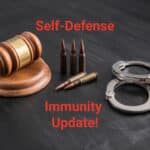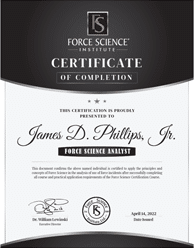
- March 23, 2023
- |
- Immunity
Civil Immunity in Florida Gun Cases
Florida’s Civil Immunity Statute Protects those who protect themselves and others from suits by the attackers.
Self-Defense Immunity from Lawsuits
In a previous post, we discussed Self-Defense Immunity from Prosecution. This post will explore a closely related topic, immunity from civil lawsuits after lawful self-defense. It should come as no surprise that the police will investigate any shooting, even when the shooter claims it was self-defense. Criminal charges are always a concern after you have had to defend yourself. Unfortunately, even if you are not charged with a crime, or if you are charged and your attorney gets the charges dismissed, you may still find yourself as the defendant in a lawsuit. Fortunately, Florida law provides protection for those acting in self-defense in both criminal and civil court.
Justifiable Use or Threatened Use of Force
Both civil and criminal immunity are covered by the same Florida Statute, § 776.032. The statute provides immunity from criminal prosecution when “[a] person uses or threatens to use force as permitted in § 776.012, § 776.013, or 776.031 . . .” See our articles on Justifiable Use of Force, Justifiable Use of Deadly Force, Protection of Property, and the Castle Doctrine and Stand Your Ground for more information on these statutes.
What is Immunity?
Immunity applies to the entire process involved after a self-defense incident occurs. It attaches immediately when force is used, and applies throughout the investigation, as well as in any court case that comes out of the incident. In self-defense cases where the person is never arrested, they have Florida’s Immunity statute to thank.
If a person defends themselves and uses any type of force against another person, they may be sued by their attacker or, if the attacker does not survive, the attacker’s family. If a complaint is filed against you, immunity is not automatic. You must raise the issue of immunity. Immunity applies throughout the entire process unless it is overcome by the plaintiff. This means that you should not be made to participate in any of the usual requirements in a civil case going beyond the immunity issue, unless immunity is eventually overcome. In other words, courts should not require the defendant to answer the complaint, produce discovery unrelated to the immunity hearing, have hearings on other issues, and so on. Immunity is the first, and potentially last, issue the court must address in a self-defense case.
Immunity in Practice
Once a hearing on the motion is set by the court, it will be necessary to prepare similarly to preparing for trial. Both sides may present evidence, call witnesses, and make legal arguments. Unlike a trial, there is no jury. The judge presides over the hearing and will make the final decision. While the State has the burden to overcome a claim of immunity in criminal cases, unfortunately, in civil cases the defendant has the burden to show by “a preponderance of the evidence” that they acted lawfully and are therefore immune. This means that the defendant must show that it is more likely than not that they acted legally in self-defense. If they win at the immunity hearing, the lawsuit is ended immediately. If they do not prevail in the immunity hearing, that does not mean they lose the case. It just means that they will have to participate in the case normally. They may still have the case resolved in other ways, or they may choose to take their chances at trial.
By the time the immunity hearing is resolved, the defendant’s legal fees can be $50,000 or more. Luckily, Florida’s civil immunity law comes to the rescue again. If the defendant wins at the immunity stage, the plaintiff will be responsible not only for the defendant’s legal fees, but also all costs borne by the defendant including lost work income! The Florida Legislature did not want to allow criminals to attack people and then sue their victims for defending themselves. In the immunity statute, the Legislature wrote:
“The court shall award reasonable attorney’s fees, court costs, compensation for loss of income, and all expenses incurred by the defendant in defense of any civil action brought by a plaintiff if the court finds that the defendant is immune from prosecution . . .”
This language provides an additional protection for those who only want to keep themselves and their families safe, ensuring that when people legally defend themselves, they won’t end up financially ruined by the very person who tried to hurt them in the first place.
Get in touch

"*" indicates required fields
Copyright © 2022-2025 The Firearm Firm All rights reserved.






















